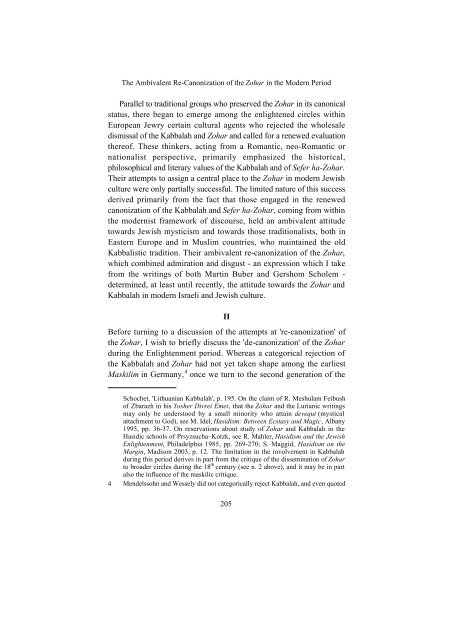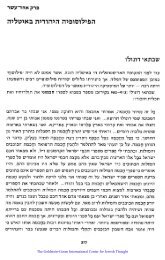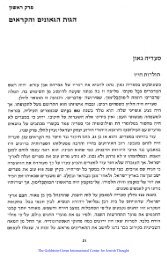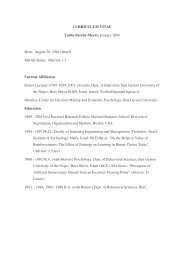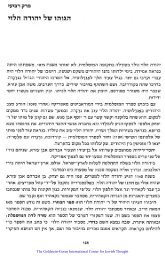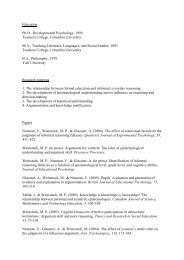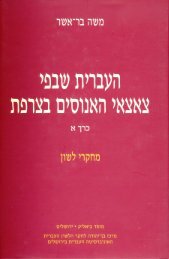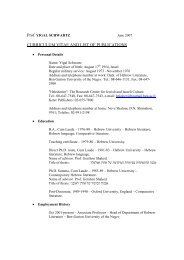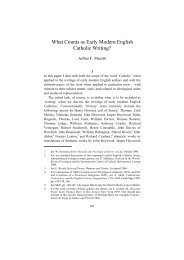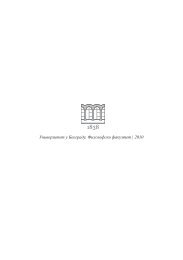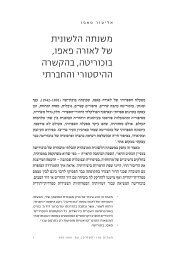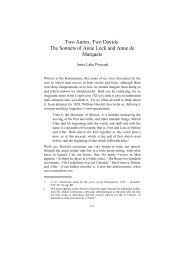Admiration and Disgust: The Ambivalent Re-Canonization of the ...
Admiration and Disgust: The Ambivalent Re-Canonization of the ...
Admiration and Disgust: The Ambivalent Re-Canonization of the ...
You also want an ePaper? Increase the reach of your titles
YUMPU automatically turns print PDFs into web optimized ePapers that Google loves.
<strong>The</strong> <strong>Ambivalent</strong> <strong>Re</strong>-<strong>Canonization</strong> <strong>of</strong> <strong>the</strong> Zohar in <strong>the</strong> Modern Period<br />
Parallel to traditional groups who preserved <strong>the</strong> Zohar in its canonical<br />
status, <strong>the</strong>re began to emerge among <strong>the</strong> enlightened circles within<br />
European Jewry certain cultural agents who rejected <strong>the</strong> wholesale<br />
dismissal <strong>of</strong> <strong>the</strong> Kabbalah <strong>and</strong> Zohar <strong>and</strong> called for a renewed evaluation<br />
<strong>the</strong>re<strong>of</strong>. <strong>The</strong>se thinkers, acting from a Romantic, neo-Romantic or<br />
nationalist perspective, primarily emphasized <strong>the</strong> historical,<br />
philosophical <strong>and</strong> literary values <strong>of</strong> <strong>the</strong> Kabbalah <strong>and</strong> <strong>of</strong> Sefer ha-Zohar.<br />
<strong>The</strong>ir attempts to assign a central place to <strong>the</strong> Zohar in modern Jewish<br />
culture were only partially successful. <strong>The</strong> limited nature <strong>of</strong> this success<br />
derived primarily from <strong>the</strong> fact that those engaged in <strong>the</strong> renewed<br />
canonization <strong>of</strong> <strong>the</strong> Kabbalah <strong>and</strong> Sefer ha-Zohar, coming from within<br />
<strong>the</strong> modernist framework <strong>of</strong> discourse, held an ambivalent attitude<br />
towards Jewish mysticism <strong>and</strong> towards those traditionalists, both in<br />
Eastern Europe <strong>and</strong> in Muslim countries, who maintained <strong>the</strong> old<br />
Kabbalistic tradition. <strong>The</strong>ir ambivalent re-canonization <strong>of</strong> <strong>the</strong> Zohar,<br />
which combined admiration <strong>and</strong> disgust - an expression which I take<br />
from <strong>the</strong> writings <strong>of</strong> both Martin Buber <strong>and</strong> Gershom Scholem -<br />
determined, at least until recently, <strong>the</strong> attitude towards <strong>the</strong> Zohar <strong>and</strong><br />
Kabbalah in modern Israeli <strong>and</strong> Jewish culture.<br />
II<br />
Before turning to a discussion <strong>of</strong> <strong>the</strong> attempts at 're-canonization' <strong>of</strong><br />
<strong>the</strong> Zohar, I wish to briefly discuss <strong>the</strong> 'de-canonization' <strong>of</strong> <strong>the</strong> Zohar<br />
during <strong>the</strong> Enlightenment period. Whereas a categorical rejection <strong>of</strong><br />
<strong>the</strong> Kabbalah <strong>and</strong> Zohar had not yet taken shape among <strong>the</strong> earliest<br />
Maskilim in Germany, 4 once we turn to <strong>the</strong> second generation <strong>of</strong> <strong>the</strong><br />
Schochet, 'Lithuanian Kabbalah', p. 195. On <strong>the</strong> claim <strong>of</strong> R. Meshulam Feibush<br />
<strong>of</strong> Zbarazh in his Yosher Divrei Emet, that <strong>the</strong> Zohar <strong>and</strong> <strong>the</strong> Lurianic writings<br />
may only be understood by a small minority who attain devequt (mystical<br />
attachment to God), see M. Idel, Hasidism: Between Ecstasy <strong>and</strong> Magic, Albany<br />
1995, pp. 36-37. On reservations about study <strong>of</strong> Zohar <strong>and</strong> Kabbalah in <strong>the</strong><br />
Hasidic schools <strong>of</strong> Prsyzsucha–Kotzk, see R. Mahler, Hasidism <strong>and</strong> <strong>the</strong> Jewish<br />
Enlightenment, Philadelphia 1985, pp. 269-270; S. Maggid, Hasidism on <strong>the</strong><br />
Margin, Madison 2003, p. 12. <strong>The</strong> limitation in <strong>the</strong> involvement in Kabbalah<br />
during this period derives in part from <strong>the</strong> critique <strong>of</strong> <strong>the</strong> dissemination <strong>of</strong> Zohar<br />
to broader circles during <strong>the</strong> 18 th century (see n. 2 above), <strong>and</strong> it may be in part<br />
also <strong>the</strong> influence <strong>of</strong> <strong>the</strong> maskilic critique.<br />
4 Mendelssohn <strong>and</strong> Wessely did not categorically reject Kabbalah, <strong>and</strong> even quoted<br />
205


